|
|
|
into Jordan
Wednesday, October 5 2005
setting: Kibbutz Lotan, Southern Isræl
A little after dawn, as the light from the sun rising over Jordan lit up the sandstone mountains to the west of the Arava, I got my first coffee of the morning from the empty Kibbutz Lotan dining room and then we hit the road, this time as a southward-bound convoy. Our rental car followed the one driven by Gretchen's father, which was still missing the front right turn signal assembly that had been stolen in Tel Aviv. Our destination was the resort city of Eilat at the northern tip of the Gulf of Aqaba, a finger of the Red Sea.
Along the way, the golden sandstone mountains of the Isræli side were gradually replaced by those made of pinkish granite, something that had happened further to the north on the Jordanian side. Not only are the continental plates moving away from each other at the Arava, the Asian plate carrying Jordan is heading northward with respect to the African plate carrying Isræl.
We parked our cars in a lot at the border checkpoint to Jordan, where (with any luck) we'd be spending the rest of the day. It's theoretically possible to drive from Isræl to Jordan through the Arava Checkpoint, but in practice it's too complicated and expensive so nearly everyone crossing this border does so on foot. You get your paperwork stamped on the Isræli side, pay the exit fees, and then walk across no-man's-land to the Jordanian side, taking note of the change in asphalt color and texture that occurs at the border. The last Isræli you see on your way out a tall young plain-clothed sabra holding a ginormous machine gun, and the first Jordanian you see is dressed in full military uniform and carrying a similarly big gun. The Isrælis are significantly more alert and engaged than the Jordanians are, probably because the Jordanians are the ones with the history of attacking across this border. This frontier has been quiet for over thirty five years, but still this was the tensest border crossing I've ever made.
The first thing you notice as you approach the first Jordanian checkpoint is the big color picture of the late Hashemite King Hussein and his son, the current king, Abdullah II bin Al Hussein. I haven't spent a lot of time in countries with authoritarian traditions, but I know from television that the despotism of a government is in direct proportion to the size of the posters of its leaders (multiplied by the number of such posters). For example, as much as I hate the despotism of George the Ugly American II, I can take comfort in the fact that his picture's official display is limited to eight and half by eleven photos in government offices. In Jordan, though, poster-sized pictures of King Abdullah are everywhere, even in commercial areas. I saw few if any actual billboard depictions, meaning his despotism is nowhere near the level of a Saddam Hussein or Augusto Pinochet, but if you're Jordanian it's definitely something to watch out for.
Once we were past the first checkpoint, our bags went through an x-ray machine and then I had to open mine up because of all the wires and what not. As the inspector was looking, his boss came in and kept making fake explosion noises and saying "it's a bomb!" in English. He obviously didn't think I was much of a threat. Nobody even bothered to open the bags belonging to Gretchen or her parents.
We waited in front of a little shop with other foreigners as the border authorities dealt with our passports, a process that took an unexpectedly long time. Gretchen's father ordered us both coffees, which were prepared over an open flame and served in tiny cups. "Now that's Turkish coffee," Gretchen exclaimed when she saw it. It was a thick slurry of fine coffee grounds, pre-sweeted and (strangely) seasoned with cardamom. I ended up having to drink both mine and Gretchen's father's. That's the kind of coffee addict I am.
By now we we'd been introduced to our Jordanian tour guides, who would be taking us on a tour of Wadi Rum and, tomorrow, the lost Nabatean city of Petra.
We loaded up in a van and started our drive from the Jordanian port city of Aqaba (Eilat's neighbor across the frontier). The drive into the highlands to the north was spectacular, with crumbling, barren granite mountains on either side of the road. Less impressive was the endless schpiel being delivered by of one of our guides. He kept going on and on about how great the new king was and how everything was improving in the country. If he was to be believed, women in Jordan have equal rights with men, everyone votes in democratic elections, and there isn't the slightest animosity towards either Jews or Isræl. Even if he wasn't a government mouthpiece, he sure sounded like one. I'm always skeptical of anyone who paints an unqualified rosy picture of anything, unless (of course) it's Mozilla.
Eventually we pulled into a parking area beside a colorful-yet-dreary concrete-and-dust Bedouin resettlement along the highway and continued eastward in a four wheel drive Toyota. We stopped initially the brand new Wadi Rum visitor's center, a tasteful desert compound made of blocks of local sandstone. Initially it seemed like we were the only ones there and our visit was part of a cumulative consecration of the center as a functioning entity. We were, for example, the only people in the theatre when we were shown the introductory film (which ended abruptly due to a technical glitch). And we were also the only people in the text-heavy museum, where I felt our visit was unnecessarily hurried. But then we were rumbling across the desert into the vast spaces and picturesque geology of the wadi proper.
Our first stop was a traditional-style Bedouin encampment, where we were treated to tea despite the fact that today was the first day of the Ramadan fast. An unexpected delight was a playful young kitten hanging out in the tent.
There was a spring in the cliffs above the camp, and Gretchen and I made a half-hearted attempt to climb the boulders up to it, but we only made it about half the way before deciding to turn around. The view up there was, as you might imagine, incredible. With its red sands and cliffs, from certain directions Wadi Rum looks like the surface of Mars.
We drove around some more, taking in the sand dunes, natural bridges, and peculiar sandblasted cliffs that resembled architectural details on a building designed by Gaudi. One particularly narrow gorge up into one of the cliffs was an especially popular attraction; here we saw lots of other people in other tour groups (mostly from all over Western Europe, particularly including Spain). I ventured further up this gorge somewhat further than most people do, resorting to what little common sense I have about rock climbing. On the way back, I noticed the unfossilized remains of barnacles encrusting the undersides of some of the rocks. Holy shit! These rocks had been on the seashore not very long ago at all (though now they are over a half mile above sea level).
In general, our guide, the guy who had previously been serving as such a transparent mouthpiece for the Hashemite Kingdom, proved useless whenever we asked him about the whys and hows of the geology. "It was underwater, then earthquake, now it's like this." He'd explain. Sometimes he'd give information that was clearly bogus, such as the claim that Wadi Rum is as far below sea level as the Dead Sea, even though our vehicles had only gone uphill, and rather steeply so, since leaving the sea level port of Aqaba. Of course, I'd need Google to find out how wrong he actually was.
Gretchen blew our guide's mind when she told him that she and I are atheists. He'd lived in Spanish Harlem and driven a cab in New York City. He could speak some Spanish and he loved Mexican food, but he had never met anyone who denied the existence of God. "How can you explain all this without a God?" he demanded, motioning towards the cliffs and sand. There's an easy answer to that question, and it's always another question: "How do you explain God?" In science, which seeks to know everything, God is no explanation at all.
At several points along the way, it seemed we were being hurried through Wadi Rum, and I suppose this was a natural consequence of the economics: our guides had been paid a fixed amount to get us to our hotel, and any dawdling we did in the Wadi was less free time for them. Heading north, from the wadi, though, we did stop at a store for snack food and drinks (the guy running the place was sleeping on a mat when we arrived). And later we had several opportunities to get out and take pictures of shepherds and their flocks. Only once did they come after us demanding money.
As we got closer to our destination in Taybet, we climbed to over a mile in elevation and the landscape became somewhat less arid. It was still plenty rocky, and most of those rocks were big chunks of flint, the kind a stone age entrepreneur would consider a valuable resource. These days rocks just get in the way of agriculture, and generations of shepherds with plenty of idle time had stacked the rocks in walls, cairns, and piles. The battle against rocks never ends, though, as new ones continued to wiggle their way loose from the soil in every square foot on every business day.
Our hotel was the Taybet Zaman Hotel in Taybet. The hotel acutally occupies the entire "old village," with what had once been individual stone bedouin homes comprising suites and rooms for guests, with outdoor walkways connecting them. It's a five star hotel owned by the French Sofitel corporation, so we didn't find ourselves dealing with any Ramadan (or even Islamic) restrictions. I have no idea what it costs to stay there; Gretchen's parents paid for the whole thing.
As Wadi Rum had initially seemed, so too did the Taybet hotel. We wandered the outdoor corridors and saw no one. When Gretchen and I went to the pool for a swim, the only other person there was the lifeguard. And, Jesus Christ, the water was cold!
Being a fan of Arabic music, I'd been eager to hear my first adhan (call to prayer) broadcast from a minaret, and that had sort of happened, in a limited way, when I'd been at the Western Wall in Jerusalem. Something had been broadcast from the Al Aqsa mosque, though it hadn't lasted very long. Today, though, the voice from the minaret of the local mosque wouldn't shut up. At first it was a simple call to prayer, a beautiful one at that, with a deep voice chanting one thing and an ethereal high pitched voice (a child?) harmonizing on top. But later somebody was rocking the mike for something like a half hour of derranged-sounding vitriol. He could have been saying anything, of course, since he was speaking Arabic. But to my ear he sounded angry. If my brother spoke Arabic, recordings of his insane rants (the result of an untreated chemical imbalance) would sound virtually identical to what was coming out of the muezzin's mouth this afternoon. It was natural, I suppose, for Gretchen to joke that the message could be summed up simply as "kill the Jews."
Gretchen and I had little lupper meal of lentil soup and wine in the outdoor part of the hotel, waited on by what seemed like a half dozen employees since, again, we were apparently the only customers. As we dined, we socialized with a very friendly cat whom we named Achmed. Unlike most cats we'd met in the Middle East, Achmed loved to eat bread. This probably accounted for the fact he wasn't anywhere near as skinny as the other cats we had encountered. One of the waiters with rudimentary English skills chatted with us for a time, wondering if Dallas, Texas was a good place to live. Apparently he'd had a job offer there or something. "No!" we insisted, "Dallas is horrible!" Actually, I've never been there, but folks tell me it sucks.
Later another guest materialized, one whom Gretchen could tell was Isræli based on the way she spoke Arabic. So we chatted with her for a time, and she said she was a guide whose favorite destination was the Sinai, but it's become less popular with Isrælis since the Intifada. When she was joined by members of her tour group some minutes later, one of them pointed at our glasses of wine and joked, "Drinking wine on Ramadan. That's a double sin you know. You're going to Hell!"
At some point we all went to the hotel's Turkish bath, which is all very western and permits men and women to bathe together. There's only one masseur, a muscular gentleman who conducted his business while wrapped in a towel. The part where we just sat around superheating ourselves with steam was pleasant enough, though the massage part was awkward enough to be a little unpleasant. My idea of a pleasant bath is a good hot soak in a tub by myself with a pile of reading material and perhaps a drink (either caffeinated or alcoholic). Being touched and/or watched by other people just isn't relaxing for me, and it's not going to start no matter how many times Gretchen insists that to not have a Turkish bath is to miss out on an essential part of the vacation. All this, and we weren't even in Turkey yet, a place where (I was to learn later from Gilad), big beefy Turkish masseurs delight in torturing scrawny little Europeans and, especially, Americans.
After a buffet dinner back in the restaurant (which was suddenly crowded with hitherto-unseen hotel guests), Gretchen managed to scrounge time on an internet-connected workstation near the main office. For future reference, I noticed that it was connected by ethernet, meaning I could come by with my laptop and just plug in. It would be so cheap and easy for the hotel to buy a wireless router and kick up their services a notch by providing wireless internet, but (as with so many other places) they've yet to take the step. In the meantime, though, we were fully connected to a wireless signal from a completely different network, one whose wireless access point was the mosque just uphill from the hotel. Yeah, yeah, yeah allahu akbar this!
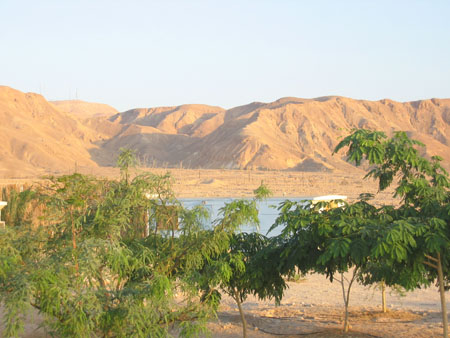
Kibbutz Lotan just after sunrise.
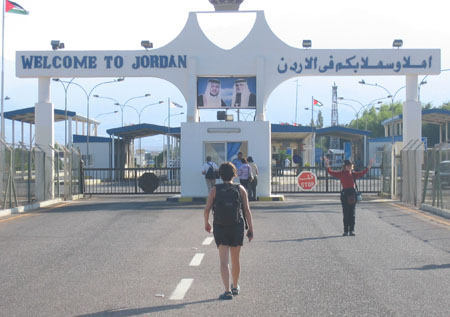
Welcome to Jordan! The first Jordanian checkpoint after leaving Isræl. We didn't see any more Hebrew once we'd crossed the border.
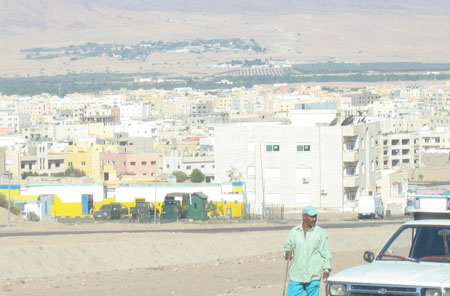
Aqaba, Jordan (foreground) and Eilat, Isræl (background) viewed from the east.
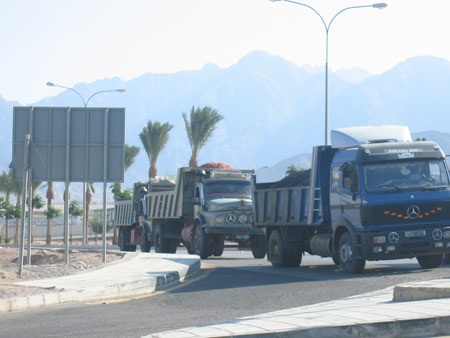
Newly-planted palms and big trucks in Aqaba, Jordan.
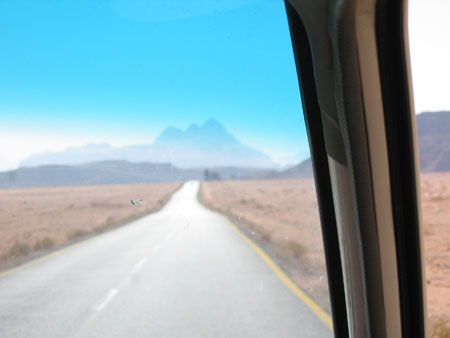
The road to Wadi Rum from Aqaba.
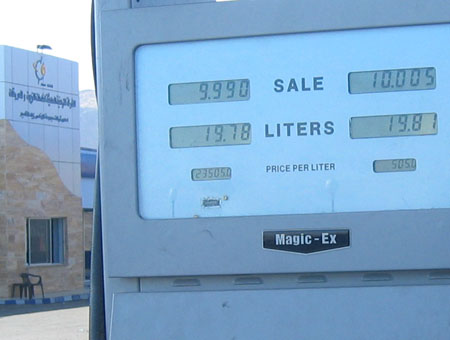
A Jordanian gas pump. For some reason it's entirely in English.
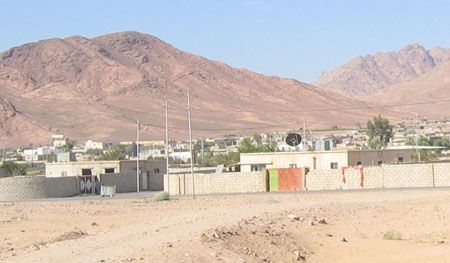
A permanent Bedouin village outside Wadi Rum.
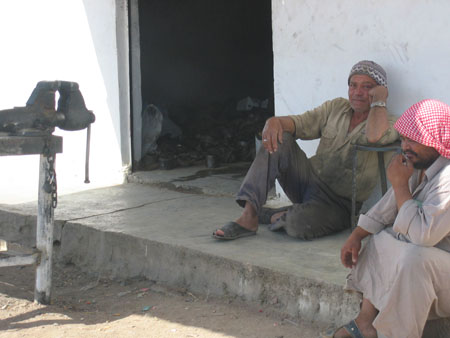
A blacksmith shop outside Wadi Rum.
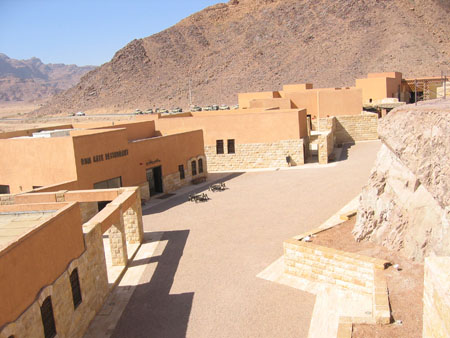
The Wadi Rum visitor center.
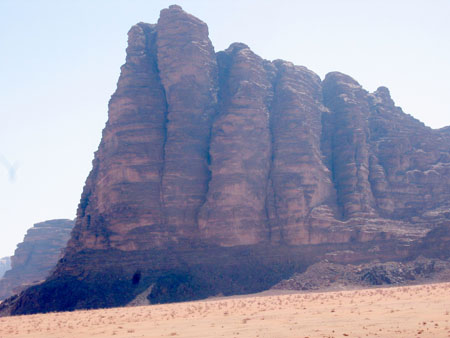
The "Five Pillars" or "Seven Pillars" at the entrance to Wadi Rum. These are named after either the five pillars of Islam or T. E. Lawrence's "Seven Pillars of Wisdom."
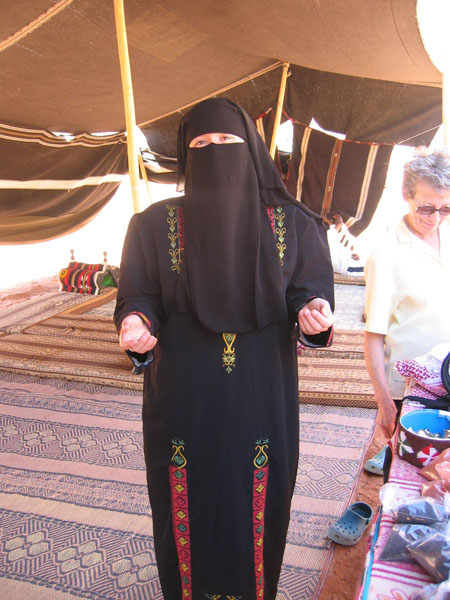
Gretchen dressed in traditional Bedouin attire at the place in Wadi Rum where we stopped for tea. For this photo, I told her to do her middle-aged Long Island Jewish woman impersonation.
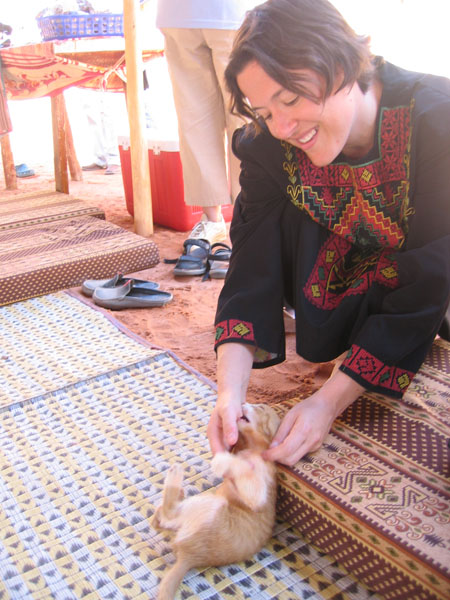
Gretchen plays with a kitten at the Bedouin encampment.
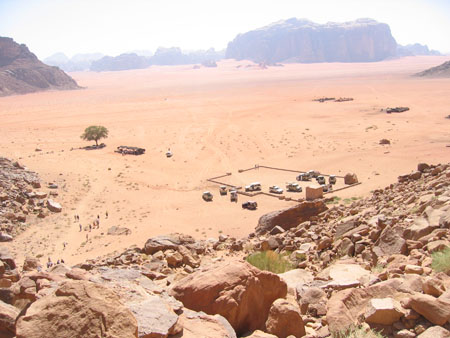
Wadi Rum viewed from halfway up a bouldery hillside above the encampment where we stopped for tea.
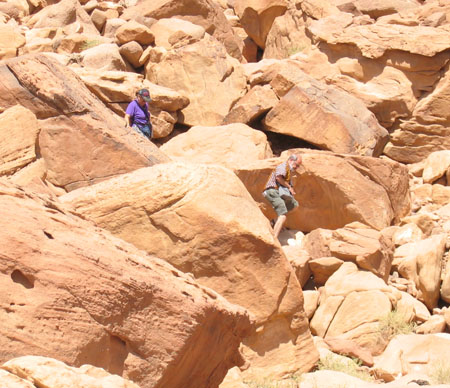
Gretchen's parents climb through those boulders.
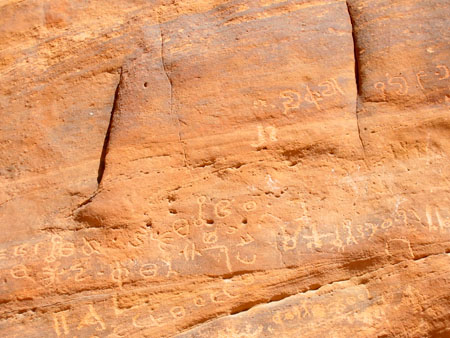
Graffiti in Wadi Rum.
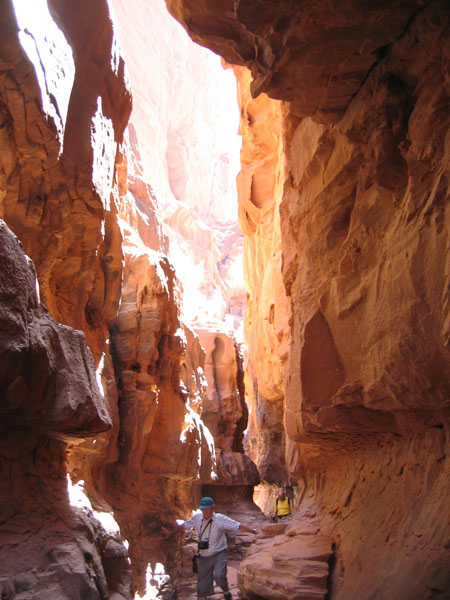
Inside a narrow gorge in Wadi Rum.
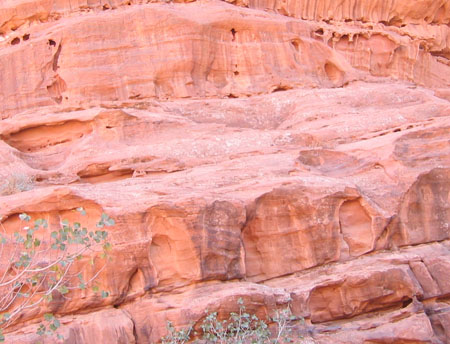
Sandblasted cliff faces at Wadi Rum.
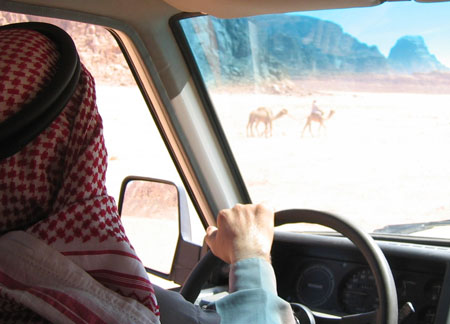
Our driver passes a couple camels in Wadi Rum.
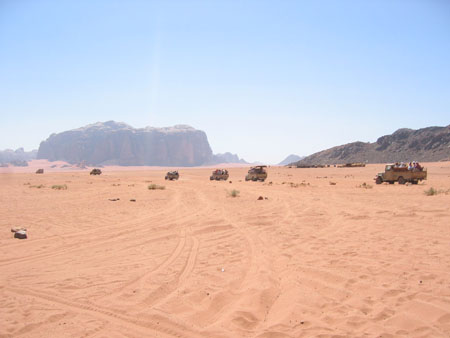
Trucks in Wadi Rum.
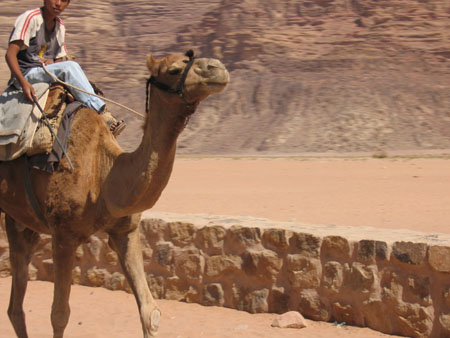
A young Bedouin on a camel.
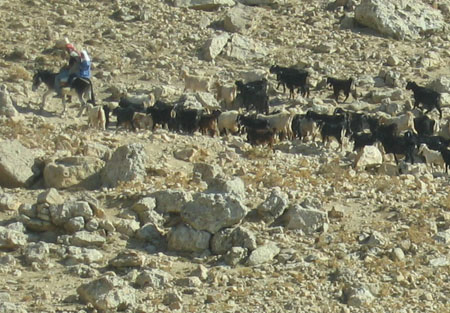
A shepherd leads his flock in the mountains southeast of Tybet. No wonder this land is arid and remains so.
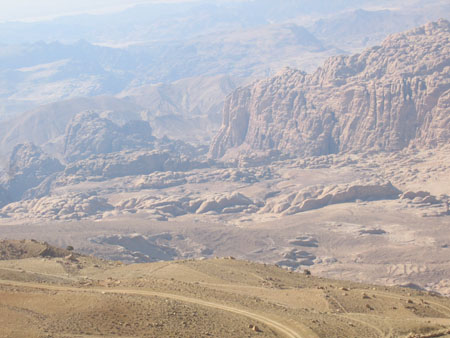
An interesting, possibly volcanic, geologic structure on the road to Tybet.
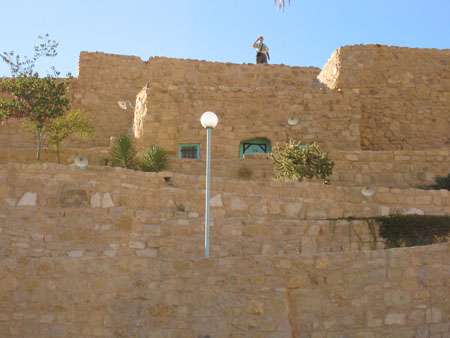
A manmade cliff at the Taybet Zaman Hotel. That's Gretchen's father at the top.
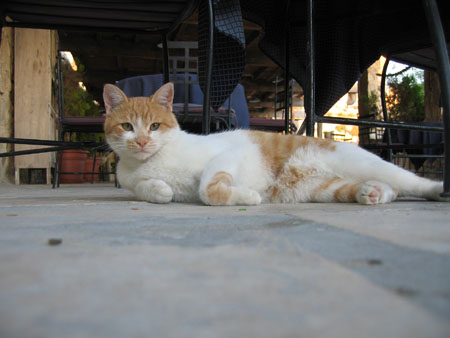
"Achmed," a friendly cat at the Taybet Zaman Hotel.
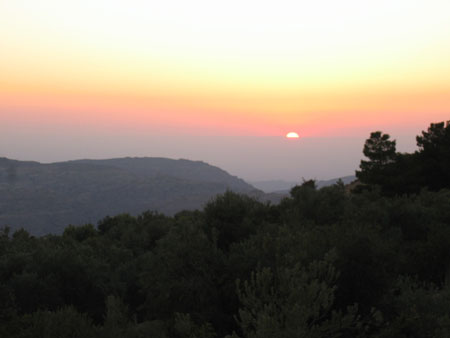
Sunset over Isræl viewed from Tybet, Jordan.
For linking purposes this article's URL is:
http://asecular.com/blog.php?051005 feedback
previous | next |
























